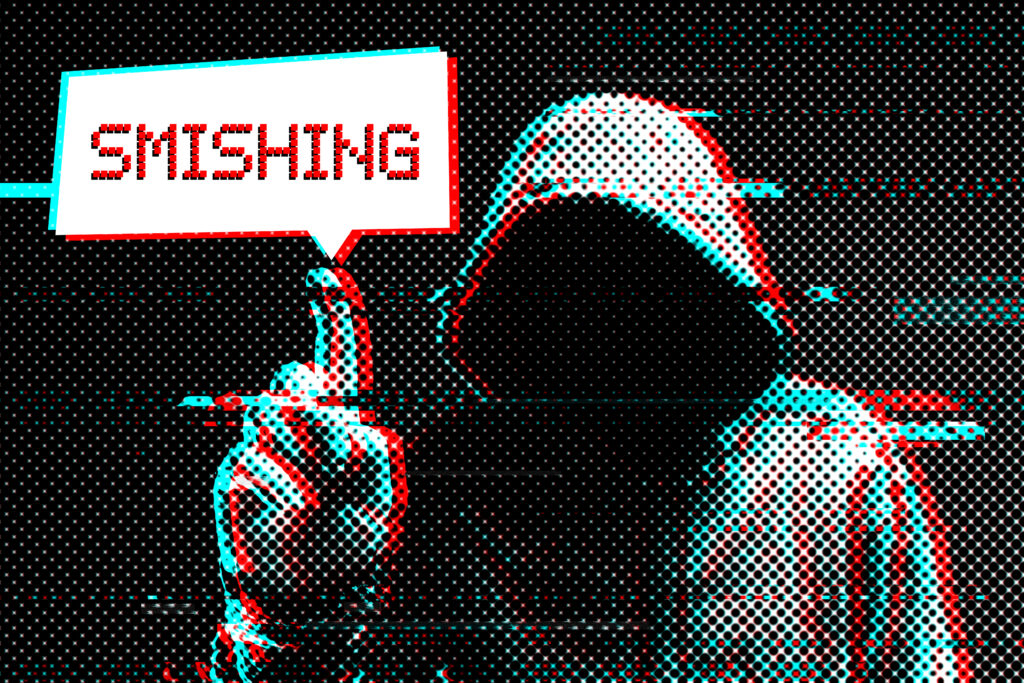
As digitalization advances in the business world, the threat posed by cybercrime is increasing. While phishing attacks through email have long been known, another malicious method is on the rise – smishing. This term describes phishing attacks conducted through SMS or messaging services. As more companies rely on mobile devices, smishing is becoming an increasing risk to corporate data security. This article explains how smishing occurs, the associated risks, and the protective measures businesses should take.
What is Smishing?
Smishing is a specific form of phishing where attackers attempt to steal sensitive data, such as passwords, credit card information, or other confidential business information, via SMS. The term combines “SMS” and “phishing.” Smishing messages often contain links or requests designed to entice recipients into clicking fraudulent websites or downloading harmful software.
Example of a typical smishing message: “Urgent message from your bank account: Suspicious activity detected. Confirm your identity here: [Link]”
How Does Smishing Work?
Smishing attackers use the same psychological tactics as traditional phishing attacks: they play on the fear, curiosity, or urgency of recipients. A typical scenario could be an SMS from a supposed service provider urging the user to act quickly to prevent potential harm.
Smishing is particularly dangerous because mobile devices play a central role in many people’s daily work. Employees often use the same devices for both personal and business purposes, increasing the risk that fraudulent messages will go unnoticed. Carelessly clicking a malicious link can quickly have serious consequences.
The Risks of Smishing for Businesses
For companies, the risks of a smishing attack are significant. Here are just some examples of how smishing can endanger your business:
- Data Loss: Smishing can lead to the theft of confidential corporate data, resulting in financial losses or damage to your reputation.
- Device Compromission: Attackers can install malware that provides access to business information or control over the device.
- Compliance Violations: Depending on the industry, the loss of sensitive data can have serious legal consequences, particularly in sectors with strict data protection regulations (e.g., GDPR).
Protective Measures Against Smishing
Fortunately, there are several measures companies can take to protect themselves against smishing attacks:
- Employee Training: One of the most effective protective measures is to regularly educate employees about cyber threats like smishing. They should know how to recognize suspicious messages and respond appropriately.
- Anti-Phishing Software and Multi-Factor Authentication (MFA): Companies should use specialized security software that scans SMS messages for potentially harmful content. Additionally, MFA adds a layer of protection by ensuring that even if a password is stolen, unauthorized access is still prevented.
- Mobile Device Management (MDM): Implementing MDM solutions, such as those offered by Cortado Mobile Solutions, helps companies securely manage mobile devices. With MDM, IT departments can set specific policies for all mobile devices to minimize potential security risks. While MDM solutions like Cortado MDM don’t directly counteract smishing, they do help by enforcing a strict separation between business and personal use areas on devices. If an employee responds to a “private” fraudulent message, the business area remains secure, ensuring that corporate data is protected.
Conclusion: Prevention is the Best Protection
With smishing, the main target and vulnerability is always the human factor. The only truly effective defense is: training, training, and more training. Only if employees understand and recognize smishing can they effectively prevent attacks. Technically, multi-factor authentication solutions are also advisable, as they prevent an attacker from accessing data even if usernames and passwords are compromised. Without multi-factor authentication, a criminal cannot access an account.
In the event of an attack, affected passwords should be changed without delay.
If you would like to learn more about how to protect your company effectively from smishing and other mobile security threats, contact us for a free demo of our MDM solution.